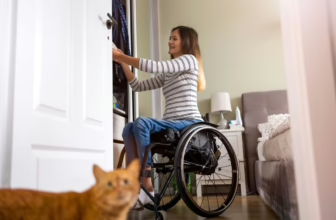Relocating to a new residence can be an overwhelming task for anyone, but for individuals with disabilities who own fragile items, it can present even more unique challenges. Fear of the unknown and worries about fragile belongings arriving intact can add stress to an already demanding process.
The good news is that a successful move is not only possible but also achievable with strategic forethought and careful execution. In this article, we will explore multiple strategies designed specifically with your needs in mind.
Early Planning
The establishment of a well-structured plan is one strategy that can ease relocation-related stress for individuals with disabilities.
Early planning allows you ample time to meticulously list down and eventually execute each essential task, from updating your address to packing your delicate belongings. Prioritizing seemingly minor details, such as deciding how to pack fragile items safely, becomes less strenuous with sufficient time at hand.
An organized approach prevents the scrambling frenzy associated with last-minute preparations and ensures a smoother transition into your new home. For disabled individuals managing fragile items, early planning emerges as an effective strategy for crafting a hassle-free moving experience.
Safe Packing of Fragile Items
Safe packing is another crucial strategy that comes into play when it's time to manage fragile belongings. As items deemed fragile can range from glassware to delicate electronics, every packed item requires its own unique form of protection.
Consider bubble wrap or packing peanuts as a useful means to shield your valuables during the commute. These materials help by absorbing shocks and impacts that could otherwise damage your possessions.
Never overlook labeling either; a conspicuous label prominently placed on each box containing fragile items can make a world of difference. This alerts anyone handling these boxes to proceed with utmost care, a small step that ensures increased protection for your most precious belongings during this important transition.
Professional Assistance
Relocation for people with disabilities inevitably presents unique challenges. Seeking professional help offers numerous benefits, acting as one of the best relocation assistance tips and guides available to those handling fragile items during a move.
Moving professionals are equipped with the skills and knowledge necessary to handle various types of circumstances, making them an advantageous addition to any moving endeavor. Especially for physically demanding tasks such as lifting and carrying heavy objects, their expertise proves invaluable.
Knowing that your belongings are in the hands of experienced professionals can significantly reduce stress linked to damaging fragile items. Besides ensuring physical safety, this option also grants peace of mind, a priceless attribute during an often upheaval-filled period like relocation.
Effective Communication
Another indispensable strategy for individuals with disabilities relocating with fragile items is open communication.
From the outset, it's crucial to elucidate your specific needs and expectations to your chosen moving company. This interaction goes well beyond defining common moving terms, extending into clarifying details related to disability requirements and your fragile belongings.
Relaying essential information like wheelchair accessibility or efficient ways of packing and transferring medical equipment prompts a shared understanding with those assisting you during the move. Discussing physical constraints or potential challenges in advance facilitates a smooth transition from one place to another.
Self-Care During the Moving Process
Amid the ensuing hustle and bustle of a move, catering to your own physical and emotional needs becomes increasingly important. While relocating with fragile belongings as an individual with disabilities comes with its unique set of challenges, maintaining self-care rituals should never be compromised.
Take regular breaks as needed throughout this process to counteract both physical fatigue and mental stressors. Feed your body nutritious meals, hydrate often, and aim for adequate rest. All these can contribute to keeping your energy levels consistent during this busy period.
Don't hesitate to seek support from friends, family, or caretakers when pressure mounts, too. Remember that taking care of oneself serves as a fundamental strategy vital for any successful relocation journey.
Assessing the New Location
Before finalizing your relocation, thoroughly evaluate the new location's suitability for your specific needs. This includes checking whether the home design features pertinent accessibility measures such as ramps, safety railings, or wide doorways — especially important if you're a wheelchair user.
In case there are major adaptations required in the new premises (like installing an elevator or ramp), ensure these adjustments are completed ahead of moving day. Anticipating and addressing these factors prior to settling in eases much of the potential stress associated with adapting to a new environment.
Follow me down the rabbit hole!
I'm Alice and I live with a dizzying assortment of invisible disabilities, including ADHD and fibromyalgia. I write to raise awareness and end the stigma surrounding mental and chronic illnesses of all kinds.








